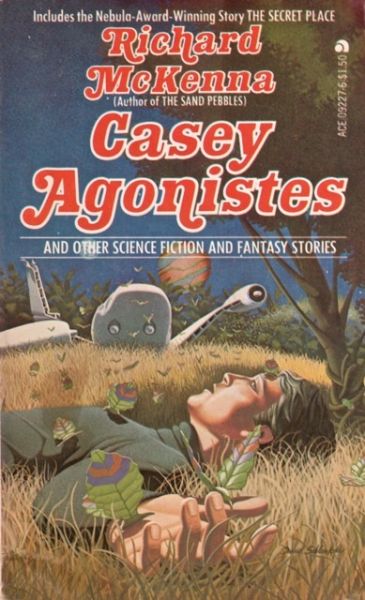Lost Voices 3: Casey Agonistes by Richard McKenna
Casey Agonistes
By Richard McKenna

22 Apr, 2000
0 comments
Casey Agonistes
Richard McKenna
Ace [1978]
212 pages
This is a collection of science fiction and fantasy short stories by McKenna. There are five stories and an introduction by Damon Knight. Descriptions do no justice to the stories.
In “Casey Agonistes”, dying patients in a terminal ward share a joint hallucination of a capering apelike being whose existence makes their circumstances more bearable.
“Hunter, Come Home” and “Mine Own Ways” may be set in the same universe. In “H,CH”, an attempt to terraform a planet to provide a niche for a carnivore on which the manhood rites of the Mordin culture depend is failing. The Mordinmen fall back on a risky technique to save the project: the attempt goes horribly wrong but there are unintended side effects due to the nature of the ecosystem they are trying to displace. “Mine Own Ways” also involves manhood rites, as a group of technicians discover the secret behind the rules forbidding contact between the galactic culture and the pre-speech hominids scattered about the galaxy and are forced to take part in the local manhood rites to survive. Interestingly enough, it is revealed that the pathway from pre-speech to full humanity is entirely due to manhood rites: women got carried along by their shared genetic heritage with men but did not contribute to the process.
“The Secret Place” won a Nebula in 1966. A geologist spends a good part of WWII searching for the source of a nugget of gold and uranium-ore found with the body of a dead boy in a region whose geology is foreign to the samples. He is aided by the dead boy's sister, who introduces the narrator to the hallucinatory [?] world she and her brother shared.
“Fiddler's Green” features a lifeboat full of men drifting in the Indian Ocean. They attempt to escape to an alternate world one of them claims to have seen, the alternate world being accessible through the power of belief: all but one of them cross more or less intact [Although two of them don't stay that way]: the last man's body is comatose but his mind is elevated to the position of a god, forming the world by force of will. People get drawn into the new world from time to time. Eventually one of the original crewmen, who shares a special bond with the crew man playing god, tires of the shared world and attempts to escape.
Richard McKenna's output was fairly small: about eleven SF&F short stories [five published after his death in 1964] and the mainstream novel “The Sand Pebbles”, which was made into a successful film starring Steve McQueen. Both Damon Knight's introduction to the collection and the entry on McKenna in the SF Encyclopedia mention that McKenna spend more than two miserable decades in the Navy and that his brief career followed his naval career. Unfortunately, both the entry and the introduction are less informative than I would have liked.
There are apparently the strongest of his SF&F stories. Various themes reappear [manhood rites, the power of the mind to share reality].
Aspects of his various careers show up in his stories, although I hope that the portrait of the terminal ward was not drawn from whatever killed him. This is a fairly solid collection: aside from “The Secret Place”, discussed below, all of the stories are quite readable.
I must admit I bounced off of “The Secret Place” and found in general that the female characters in these stories barely manage unidimensionality. I expect that “Mine Own Ways” in particular would be in no danger of a Tiptree award: not only do women in general play no role in the evolutionary history of humanity aside from that of baggage1but the particular women in the story exist only as plot tokens and goads.
Next: The Godwhale by T. J. Bass.
1: Not all that unusual in the anthropology of the day, as I remember.
